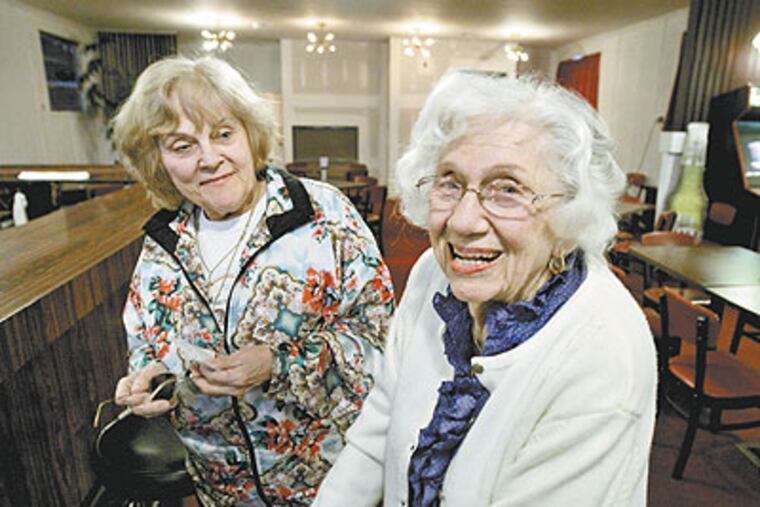Cherry Hill's 'last real bar' survives change
The bar is nearly empty. Two friends sit on opposite sides of the rectangular bar, discussing the virtues of competing NASCAR tracks. Another regular, older and sitting alone, pours his beer into his ice-cube-filled glass and watches the nightly news.

The bar is nearly empty.
Two friends sit on opposite sides of the rectangular bar, discussing the virtues of competing NASCAR tracks. Another regular, older and sitting alone, pours his beer into his ice-cube-filled glass and watches the nightly news.
It's a quiet weekday evening, like most these days at the Red Eagle Tavern in Cherry Hill. And that's why they come here, to a dimly lighted bar with worn red carpeting and bartenders who know their names and snicker knowingly when they talk about their wives and girlfriends.
"This is the last real bar in town," says one patron, a father and husband in his late 30s. "The other places, they're restaurants, and I just don't like drinking while people are eating around me, all that noise. This place is just right, nice and quiet."
With the decades-long evolution of Cherry Hill into a shopping mecca for the South Jersey and Philadelphia region, the series of bars that once dotted the township has steadily disappeared. In their place are national chain restaurants that have become the preferred drinking locale for a new generation of residents and shoppers alike.
With their entree, the price for Cherry Hill's limited number of liquor licenses has been driven up exponentially - with a champagne bar reportedly paying $1.6 million in 2007. The recession has brought those prices down, but a willing seller could still expect to get about $1 million for a license, said Colin Necky, an appraiser with the commercial real estate agency Markheim Chalmers in Cherry Hill.
"The value of a license is now set by how much interest there is from the name restaurants," he said.
For the owner of a small bar, who might have purchased a liquor license in the World War II era at a fraction of its current value, the temptation to sell is huge.
And while most did just that, Kay Labricciosa, the 94-year-old owner of the Eagle, as it's known to regulars, has refused all offers.
A former line worker at the Campbell Soup factory in Camden, Labricciosa opened the bar in 1950 with her late husband, Tony, a semiprofessional football player.
Garden State Park had opened eight years earlier, and Kay and Tony soon found their bar a regular hangout for the jockeys and trainers, who showed up at their door at 7 a.m. for breakfast and a drink or two before race time.
"Before the races, during the races, after the races, they would all be in here talking about what was happening down at the track," Labricciosa said. "On the holidays, some of them had nowhere to go, so my husband would invite them to have dinner with us."
All around them, Cherry Hill nightlife was taking off. Places like the Latin Casino and the Rickshaw Inn would soon open, drawing Philadelphians eager to escape the city's blue laws, according to the historical account Cherry Hill: A Brief History. And with them came big-name acts like Frank Sinatra, Dean Martin, and the Supremes.
That era effectively ended in 1977, when Garden State Park's grandstand burned down, and Cherry Hill's bar and nightclub owners were left to watch as their customers headed for Atlantic City.
Their death was slow, drawn out over many years, but the surge in liquor license prices in recent years was the final nail in the coffin, said Paul Schopp, a local historian.
"They were all rather dated," he said. "Even without the racetrack fire, they were eventually going to close down."
But not the Eagle.
After her husband died in 2001, Labricciosa enlisted her daughter and other relatives to help run the place.
Each night she puts on her lipstick and a blouse and sits at the bar, not drinking - she gave that up years ago - but watching the door to see who might come in.
There was a period when the bar attracted what Labricciosa refers to as "a bad element," on which she doesn't go into specifics.
"I like people, as long as they're respectful. If they're not, I tell them to get out," she said. "People come here to sit and relax. They don't want to hear cursing."
And so she sits, fussing over her favorite customers, inquiring about their jobs and whether they've eaten dinner. And giving sidelong glances to those not in her favor.
At 3 a.m., she closes up, kicks anyone still left out into the night, and walks through the garage that connects the bar to her house.
"What else am I going to do?" Labricciosa asks. "I don't like Florida. I even went to California. I didn't like that, either."